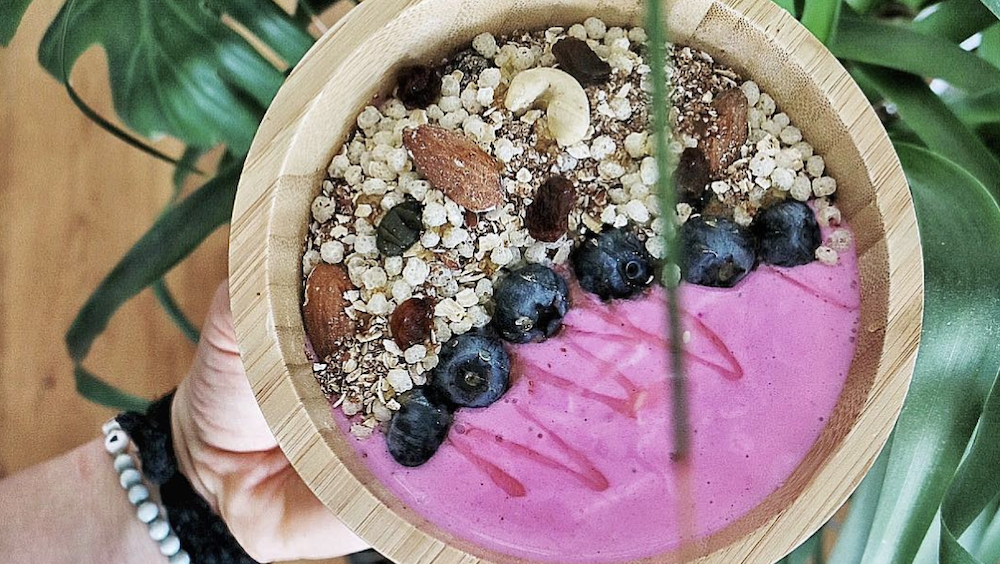
What do you eat before/after exercise? It's a very easy question, but there really isn't one answer. Maartje from Healthy Recipes gives 5 tips!
As a fanatic runner and food blogger I often get the question 'What do you eat before/after exercise?' It is a very personal answer; this depends on your sport, motivation, goal and of course biological build. Not a very clear answer, but of course there are tips that can help you formulate an answer to this question for yourself.
It is important that you have your own goal. Do you exercise because you want to stay fit, because you want to run a personal record in the half marathon, because you want to be able to lift more weight, or because you just like to relax during yoga a few times a week? Depending on your goal, you determine what you can eat before and after exercise. High intensity or long training sessions logically require more nutrition and exact macros. If you are an I-go-for-myself-exercise-athlete, then I wouldn't worry too much about what exactly you eat before or after exercise. Make sure you have breakfast and do not exercise when hungry. And eat this at such a time that it does not 'come up' during your training. This is a matter of trial and error. If you have a real goal - and I mean a really serious big goal - I advise you to go to a nutrition coach or personal trainer, they know a lot about it and can help you achieve your goal with realistic sub goals.
Also read:4 tips for a flat stomach without a gym
The idea of food is to give you energy – just in case you thought it was really just for fun and/or fun. If you know how much you burn during exercise, you also know how much you can eat. Actually, this is super logical, but it is sometimes forgotten. If you eat less than you burn, you will lose weight. If you eat more than you burn, you gain weight, a simple law of physics that has existed for centuries. Tracking your workout can be done in many different ways, from a super fancy sports watch to a simple app on your phone. It is best for you to decide for yourself what is important to you and how much you want to spend on this.
I wouldn't be called Healthy Recipes if I wasn't a fan of healthy recipes, so of course my third tip is:make it yourself! It's healthy (at least it's meant to be), you know exactly what's in it, and you can enjoy it a lot more if you know how much time and love you put into making it. You can now also choose how much protein (I will come back to this in my next tip), fats and carbohydrates. In other words, you can now make specific pre-workout and post-workout snacks. You can find inspiration, tips and ideas on healthy recipes.blog
Also read:5 questions about vegetable proteins
Proteins are very well known in the sports world, but I notice that there is actually not much knowledge about them yet. It is now clear that you have to eat protein to allow your muscles to recover, but the amount and when is still a big question mark. I'm going to tell you something:a protein deficiency in the Netherlands is quite difficult to get. We are people who love dairy, that's just the way it is. Compared to other parts of the world, the Dutch eat an incredible amount of dairy and therefore protein. If you exercise you can really increase your protein intake slightly, but this really only makes sense if you really do strength training and go for hypertrophy (promoting muscle building to a large extent). Another fact about protein in food, your body can absorb a maximum of 20 grams (+/- 3g, different results in the literature) of protein per meal. So if you eat more than 30 grams of protein because you think you will get super large muscles, unfortunately I have to get you out of that dream. But the good news is, a new study has now found that eating protein before exercise can promote weight loss and fat burning! A small portion of protein is enough. For example, consider a bowl of low-fat cottage cheese. This also protects your muscles against muscle breakdown during a workout.
Protein after exercise? To do! But as I said, in moderation. Just for fun, count the amount of protein you consume on a 'normal' day. The nutrition center tells us:“On average, healthy people need 0.8 grams of protein per kilogram of body weight.” If you are a strength athlete, then this amount is slightly higher. In principle, it does not matter when you eat the proteins, there are different theories, but I have noticed from experience that you can spread your protein intake over the day and still maintain the desired result (muscle recovery). If you eat vegan, it might be useful to consume additional protein-rich food. Nuts, legumes and vegetable substitutes for milk and yogurt contain a large amount of proteins and amino acids (building blocks of proteins).
Read more about proteins after exercise here.
Want to know more about nutrition and sports? Take a look at Maartje's Instagram @Gezondereceptjes.
